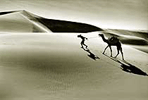Adapted from the Diégo Brosset novel, Sahara: Un homme sans l’occident, the film chronicles the life of a nomadic tracker called Alifa at the turn of the century African desert as he struggles against the assimilation of increasingly hostile rival hunting tribes (undoubtedly due to the influx of western-made rifles made increasingly available at their disposal) and widespread banditry. From the sublime, high contrast, extended opening sequence that depicts Alifa’s rescue as a last survivor of his nomadic family – in a final, desperate act of instinctive human survival (captured in extreme long shot that culminates to an uncomfortably cruel close-up) that willingly sacrifices the most valuable (and viably essential) possession of the tribe in order to offer a chance at survival for its lone (and perhaps, last) descendent – to his “adoption” into a hunting tribe where he hones his instinctual skill as a tracker, to his fall from grace at the hands of a formidable, rival tribe, Depardon creates an exquisitely photographed ethnographic portrait that is unobtrusive and objective, yet intimate. Depardon’s raw, yet aesthetically refined, meticulously observed, and intrinsically detailed camerawork powerfully, but understatedly, illustrates the unsentimental brutality and austere, savage beauty of the unforgiving landscape: a forgotten region where relentless sandstorms and indistinct, featureless topography literally erode and sweep away with time the evidentiary tracks of human trespass – and figuratively, man’s transgression against nature, humanity, and indigenous culture.
© Acquarello 2004. All rights reserved.
